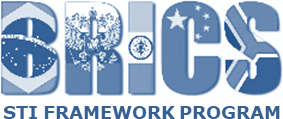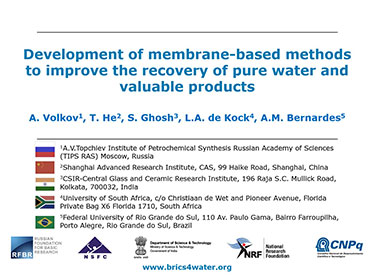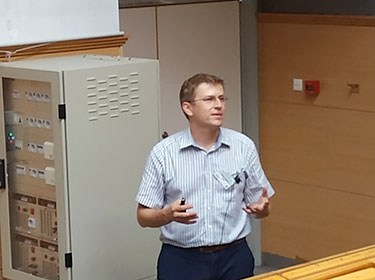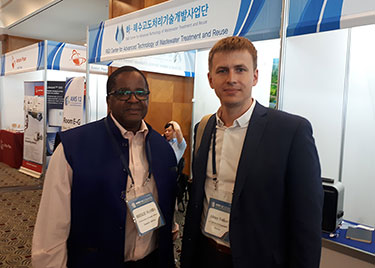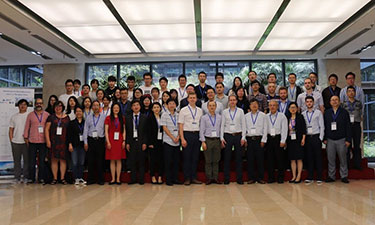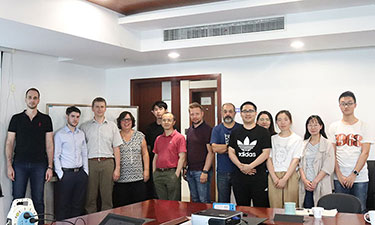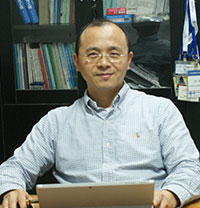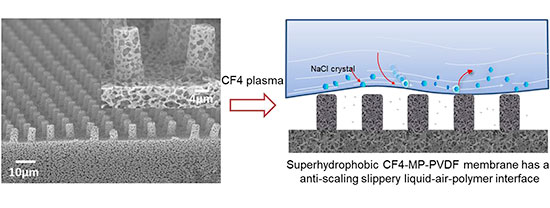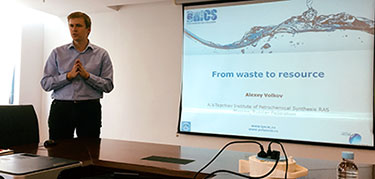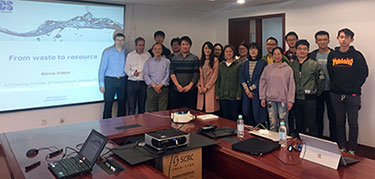BRICS meeting: University of South Africa, Johannesburg
BRICS partners from Brazil and Russia visited the South Africa counterparts from the Institute of Nanotechnology and Water Sustainability (iNanoWS), College of Science, Engineering and Technology, University of South Africa at the Science Campus from the 8th to the 10th of May.
Activities started off with a project meeting on the morning of the 8th of May. Present from Brazil were Prof Andrea, Prof Salatiel, Prof Alvaro and Prof Marco António. From Russia, Prof Alexey. Unfortunately, Prof Tao had to cancel at the last minute. The South African team consisted of Prof Lueta, Prof Richard Moutlaoli, Prof Lawrence Madikizela, Prof Machawe Motsa and Dr Ilunga Kamika. Prof Machawe from iNanoWS presented on work being done at our hollow fibre membrane spinning centre. Dr Ilunga (iNanoWS) presented on the prevalence of pharmaceuticals in wastewater as well as the prevalence of microbial resistance in the South African context.
Prof Alexey spoke on the performance of membranes for the removal of pharmaceuticals, while Prof Salatiel spoke on electrochemical advanced oxidation processes using chlorophyl modified TiO2 catalysts.
Discussions then continued on future areas of interest where work could be carried out jointly. This included work on Hollow Fibre membranes with Prof Volkov’s group, as well as a project involving all BRICS partners using their particular membranes or technologies and the same synthetic wastewater so as to directly compare the performances.
After lunch, we visited the iNanoWS laboratories. These included the Hollow Fibre Spinning Centre, the specialist Analytical Laboratories, and the general laboratories.
On the 9th of May, a seminar for staff members of the College of Science, Engineering and Technology as well as postgraduate students from iNanoWS was held. The speakers were Prof Volkov and Prof da Silva. Both talks elicited numerous questions, particularly from the iNanoWS students and Post Doctoral Fellows. After the seminar, informal discussions were held over lunch with several academics.





On Friday 10th of May, a site visit to a wastewater treatment plant situated in the Cradle of Humankind was done. The wastewater treatment plant uses a biological process to treat the wastewater. After the visit, lunch was had in the picturesque gardens of a nearby boutique hotel. Prof Volkov then left for the airport, while the colleagues from Brazil continued onto Hartbeespoort Dam to see the impact eutrophication and the counter measures being implemented.



BRICS meeting at Porto Alegre
From Marth 19th to 26th 2024, in line with development of activities of the DRUG-FREE WASTEWATER project, part of the international consortium met in Brazil; which includes the Federal University of Rio Grande do Sul and Feevale University (Brazil), TIPS RAS (Russia), Central Glass and Ceramic Research Institute (India), Zhejiang University (China) and University of South Africa (South Africa).
The program was related to visits to the laboratories of NESA-IPH (Prof. Salatiel) and LACOR-EE (Prof. Andréa) at UFRGS. Visits to Feevale laboratories (Prof. Marco Antônio) and visits to a landfill leachate treatment station using membranes. A hybrid meeting of the consortium was also held.
On March 19th, 2024, groups from all BRICS countries attended a hybrid meeting where the progress of the project was presented and discussed, as well as the schedule for the next stages. From China side, Prof. Tao presented advances in the design and preparation of high flux polymeric nanofiltration membranes with narrow pore size distribution for trace-antibiotics removal from wastewater. After, Dr. Alexey Yushkin presents the advances of the Russian side in the development of laboratory methods for preparation of chemically resistant NF membranes based on cellulose from its solvents (NMMO/Ionic liquids), for the removal of antibiotics. Dr. Swachchha Majumdar, from India side, presents the development of ceramic nanofiltration membranes for the removal of antibiotics/pharmaceutical molecules from wastewater and biodegradation/ of concentrated molecules. Whereas, from the South Africa side, Prof. Tshimangadzo Munonde presents their advances in the detection and potential removal of emerging organic contaminants in wastewater. Prof. Salatiel from Brazil side group, presents the advances in their proposal area, organic pollutants removal by advanced oxidation processes. After the presentations, the project members debated about the topic presented, asking questions about methodology, scalability, results and discussed the next steps of the Drug-Free Wastewater BRICS group. A new meeting in South Africa was agreed at the end of April 2024. If all groups are not present, hybrid meetings will be held.
 |
 |
 |
 |
During the other days, the BRICS consortium visited the laboratories of Prof. Salatiel (UFRGS), Prof. Andréa (UFRGS) and Prof. Marco Antônio (FEEVALE) where it was possible to show the bench and pilot scale equipment, as well as the analytical equipment. Based on this, the progress of the project and new partnerships was discussed. The group also visited the CRVR/BR landfill and the wastewater treatment station (landfill leachate) which operates with aerated and anoxic ponds, physical-chemical (coagulation and flotation) and polishing using polymeric membranes. The concentrate returns to the pounds while the permeate is sold as reuse water for the coal mining process.
 |
 |
| Visiting NESA-IPH-UFRGS. | Visiting LACOR-EE-UFRGS. |
|
(a) |
(b) |
| Visiting labs from Feevale University. (a) membrane equipment (b) membrane producing | |
 |
 |
| Visiting the landfill leachate treatment station using membranes from CRVR/BR. | |
BRICS project supported team won a national large project on membranes recently
National Key Research and Development Program on "Key Technologies and Applications for High-Efficiency Water Purification Membranes" kicked-off.
On March 16, 2024, the kickoff meeting of the National Key Research and Development Program's Special Project " Key Technologies and Applications for High-Efficiency Water Purification Membranes" was successfully held at the Shanghai Advanced Research Institute, Chinese Academy of Sciences (referred to as "SARI"), headed by Professor Tao He from SARI. The project consortium consists of ten nationally known teams including CAS, Tongji University, Zhejiang University, and multiple membrane and equipment manufacturers and process design consultant. The project aims to develop high performance ultrafiltration and nanofiltration membranes and short energy efficient processes for efficiently remove trace micropollutants from surface water for safe drinking.
In the coming three years, we will work together to build a novel membrane-based technology for Chinese safe drinking water ambition and hopefully our BRICS countries will also benefit from our expertise. We are proud to announce this great news to our BRICS project team because this project has been based on the seeding funds from our two BRICS projects between 2019-2021 and 2023-2025. We will continue our collaboration and bring world leading technologies for the health and economic development of BRICS countries in the near future.
The results of the 5th BRICS STI Framework Programme Call 2021 have been announced. 333 Applications were submitted. As a result of the competition, 33 projects were selected for support, including the project led by Alexey Volkov “Monitoring and removal of antibiotics from wastewater by membrane separation”. The international scientific consortium for the project included Federal University of Rio Grande do Sul (Brazil), TIPS RAS (Russia), Central Glass and Ceramic Research Institute (India), Zhejiang University (China) and University of South Africa (South Africa). Congratulations to the winners!
http://brics-sti.org/?p=new/33
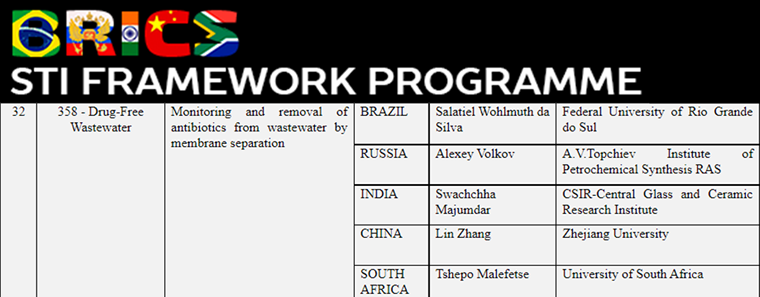
Meeting of the BRICS STI Funding Working Group
“Discussion on BRICS STI Flagship Projects”
On 27-28 June 2022 in line with development of activities of the BRICS STI Framework Programme the BRICS STI Funding Working Group held workshop “Discussion on BRICS STI Flagship Projects” aimed at discussion of BRICS STI Flagship Projects concept. The meeting gathered more than 60 participants, representing BRICS research funding agencies and policy makers, participants of the selected BRICS research thematic Working Groups and BRICS STI projects as well as other interested actors. The goal of the meeting was to exchange views on the concept of BRICS Flagship Projects, including discussion on global challenges of BRICS strategic importance that Flagship Projects could address, prospective areas of BRICS Flagship projects call for proposals, definition and requirements on potential Flagship project impact and other relevant issues.
The “Development of membrane-based methods to improve the recovery of pure water and valuable products from the waste (BRICS4Water)” project was among the reference projects that were supported as result of the first 3 BRICS STI FP calls and implemented by research consortia comprised of teams from 5 BRICS states. Alexey Volkov (A.V.Topchiev Institute of Petrochemical Synthesis of the Russian Academy of Sciences) as coordinator of “BRICS4Water” project shared results of the project and experience in implementing large BRICS research project that may be important not only to further improve the BRICS STI FP mechanisms, but also to be used for performing BRICS STI Flagship Projects.
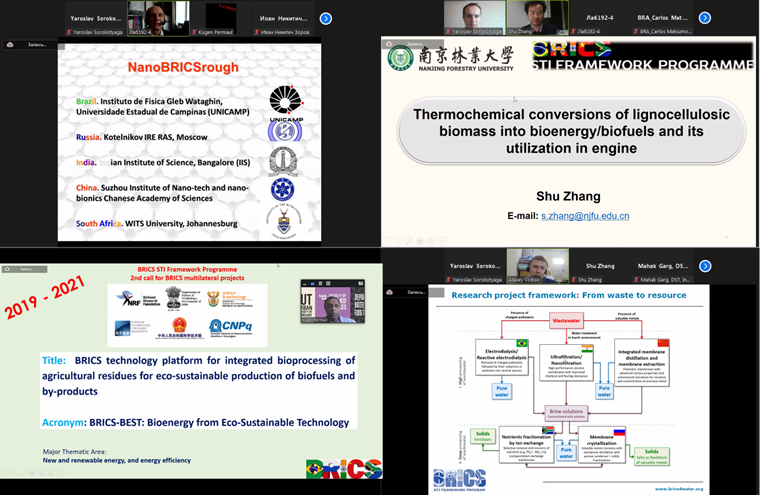
The winners of the 5th coordinated call for BRICS multilateral projects 2021 were announced on the BRICS website http://brics-sti.org/?p=new/31. The project, led by our international team led by Alexei Volkov, has passed to the next stage. Congratulations to our colleagues on winning the first stage!
The 5th coordinated call for BRICS multilateral projects 2021 was announced on the BRICS website http://brics-sti.org/?p=new/30. Call is open until 14th October 2021, 15:00 Moscow Time (UTC+3).
Scheduled scientific Russian-Indian webinar on the topic "Waste-to-Wealth Technologies" was held on the platform of the Russian Academy of Sciences (RAS) from 10 to 11 March 2021. The event was prepared by the Office of International Cooperation of the Russian Academy of Sciences, together with the Council of Science and Industrial Studies under the Government of the Republic of India and the Embassy of India in Moscow within scientific and technical cooperation between Russia and India. As part of the scientific webinar, Alexey Volkov presented an invited report on the topic “Development of membrane-based methods to improve the recovery of pure water and valuable products from the waste”.
A group of scientists working under the current International Scientific Consortium of BRICS Countries "From Waste to Resource" has developed a new compact membrane method for concentration of valuable salts from industrial wastewater for subsequent crystallization with simultaneous production of clean water. The first prototype of the installation was assembled in TIPS RAS. The principle of operation of this setup is based on the evaporation of water from the surface of a thin film of concentrated salt brine with a practically instant capture of water vapor with a porous membrane. This approach will allow concentration and extraction of target products from the aqueous solutions, solving current industrial and environmental problems. The study was published in the journal Desalination.
The recent advances in the research in the area of wastewaters treatment done by the group of Professor Tao He from Shanghai Advanced Research Institute (SARI), was recently highlighted by Chinese Academy of Science (English version / Chinese version). The primary focus was given on the results of on-going BRICS project “From waste to resource”, as well as the research supported by National Science Foundation of China and The Newton Advanced Fellowship from Royal Society (Professor Huabing Yin from Glasgow University). Particularly, on the understanding of fouling and scaling of hydrophobic membranes used in membrane distillation for treating wastewaters which are the targeted waste streams of the project. Via close collaboration with Dr. Alexey Volkov from A.V.Topchiev Institute of Petrochemical Synthesis, Russia Academy of Sciences, the team discovered a slippery effect, a hydrodynamic phenomenon on scaling and fouling resistance of the superhydrophobic membranes. The conventional thermodynamic XDLVO and nucleation theory are not able to explain the contradictory results in literature. The new theory gives a complete picture of occurrence of fouling and scaling problem in membrane distillation. It also provide fundamentally different concept to design membranes and processes for antifouling and anti-scaling membrane distillation technology.
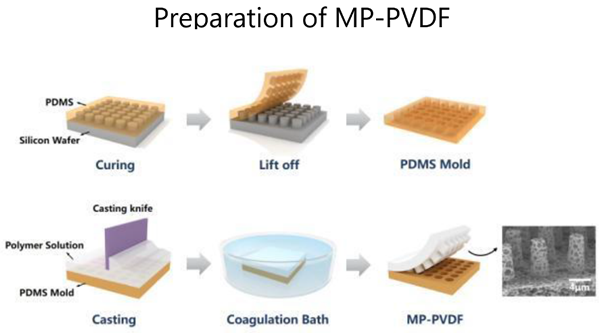
Project meeting on ZOOM
Discuss on the recent situation of all countries. To share the results and experiences in the past months. Under the threat of COVID-19 virus, all team members are still working, either at the lab or at home. For instance, the 3D printed module for concentration of brine solutions was designed and printed at home. This was the first time that the project meeting was held on ZOOM, a lifestyle change by the virus. Benefit part is that all students participated in the meeting via internet. We will continue to work by adopting the online meeting software to give all young scientists opportunities in our international project meeting.
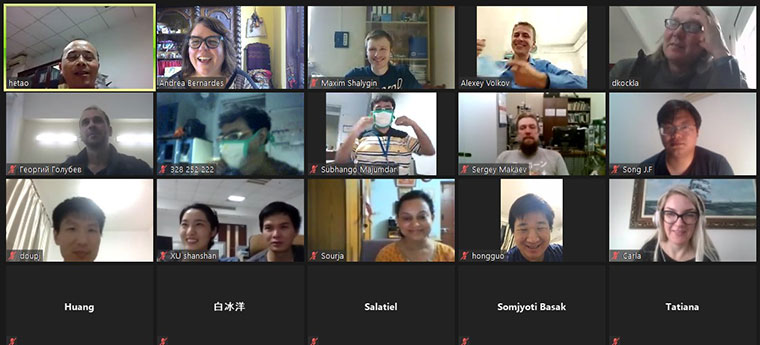
Upon the conference “GRUTTEE 2020” (Rennes, France), the leader of BRICS project Alexey Volkov visited Université de Rennes 1 and had a meeting with President of European Membrane Society Prof. Anthony Szymcyk to share the latest results of the project and to further actions to strength scientific cooperation between BRICS partners and European membranologists in the area of wastewater treatment and recovery of valuable components.
International Workshop “Membranes for Water Management and Waste to Resources with Special Focus on NextGen Membrane Technology” successfully held in Kolkata
The International Workshop “Membranes for water management and waste to resources with special focus on NextGen membrane technology” took place November 5-6 in Kolkata, India. The workshop was focused on futuristic technologies for clean energy and green environment. Around 30 participants from 5 different countries and regions, including Brazil, Russia, India, China and South Africa attended the workshop. Intensive discussions were held on NextGen Membrane Technology amongst experts in the field of wastewater treatment, membrane bioreactor, development on new ceramic and polymeric membranes and applications of membrane contactors. Exchange of ideas from multidisciplinary subjects promoted potential close collaborations, allowing us to exchange the latest progress and perspectives on future development in our own research fields. The meeting provided a valuable opportunity for all senior and junior scientists and engineers who attended.
A day before of the workshop, November 4, a meeting was held within the framework of the BRICS project “From waste to resource”, where the results of the work of the all project participating countries were presented and future prospects for the development of the project were discussed. The meeting made it possible to improve interaction between the countries in the search for new integrated and synergetic solutions on effective processing of wastewaters for recovery of valuable metals and pure water.
Alexey Volkov presented the results of BRICS project at Membrane Conference of Visegrad Countries PERMEA 2019 (Budapest, Hungary; 26-29 August 2019):
Alexey Volkov, Tao He, Sourja Ghosh, Lueta-Ann de Kock, Andrea Moura Bernardes, Development of membrane-based methods to improve the recovery of pure water and valuable products.
The short progress meeting took place between Alexey Volkov (Deputy Director of TIPS RAS) and Bhekie Mamba (the Executive Dean of the College of Science, Engineering and Technology in University of South Africa) at 12th conference of the Aseanian Membrane Society. The primary focus was given on how to further facilitate the integrity and scientific cooperation between all 5 partners within on-going BRICS project. As a follow up, one of the next project progress meeting will be held in South Africa. Conference "AMS 12" was hosted by the Membrane Society of Korea (MSK) and took place in Jeju, Korea on July 2-5, 2019.
Visualizing Water Chains within Microcrystalline COF using Electron Diffraction
Covalent organic frameworks (COFs) are emerging nanoporous crystals by stitching organic building blocks into extended 2D and 3D structures entirely through strong covalent bonds. Featuring the molecular precision and chemical robustness of architecture, COFs are of great interest in water harvesting, desalination, and resource utilization. Atomic-level characterization of the water adsorptive site and their arrangement is highly desired for the understanding and design of COFs targeting to a specific application. A team led by Prof. Yue-Biao Zhang, a member of our BRICS project, and collaborators at ShanghaiTech University has implemented the plunge-freezing and sample cryogenic transfer protocol to determine the crystal structure of the hydrated phase of COF-300 using atomic-level electron diffraction tomography. The arrangement of water in the pore was determined to have a hydrogen-bonding water chains with interaction with the nitrogen atom on the framework. This work showed the possibility of using electron diffraction to study the dynamics of porous materials with only microsized crystal, and it also provide new insight for the design of water harvesting materials. This paper has been published on JACS entitled Atomic-Level Characterization of Dynamics of a 3D Covalent Organic Framework by Cryo-Electron Diffraction Tomography, and it is elected as the Supplementary Cover (Y. Ma* and Y.-B. Zhang*, et al. JACS 2019, 141, 10962).
International Symposium “Membranes for Waste2Resources-2019" successfully held in Shanghai
Extraction of resources from waste streams is changing the paradigm of waste management where, besides water, separation of valuable organic and inorganic matter is also important. Recovering the maximum amount of these resources remains a great challenge to scientists and engineers. “Membranes for Waste2Resources” is an international network of researchers from both academia and industry. We aim to utilize membrane and/or other innovative technologies as the building blocks to create low energy, small footprint, low cost and green solutions for recovery of resources from waste streams. Supported by the Newton Advanced Research Fellowship from the Royal Society and the BRICS Framework Program of the National Natural Science Foundation China, the international symposium Membranes for Waste2Resources-2019 (W2R2019) was jointly organized by the Shanghai Advanced Research Institute, the University of Glasgow and A.V.Topchiev Institute of Petrochemical Synthesis, the Russian Academy of Sciences on June 1-2 in Shanghai.
Around 80 participants from 7 different countries and regions, including Australia, Brazil, China and Hong Kong, Italy, Russian, and USA attended the symposium. Intensive discussions were held on high performance pressure driven desalination membranes, green solvents for membrane fabrication, pre-treatment, nanotechnology for membrane analysis as well as fouling control using novel nanobubble systems. A case study on treating flooding mining water in Brazil using electrodialysis was presented as an efficient method for both water treatment and recovery of valuable metals. Exchange of ideas from multidisciplinary subjects promoted potential close collaborations, allowing us to exchange the latest progress and perspectives on future development in our own research fields. The meeting provided a valuable opportunity for all senior and junior scientists and engineers who attended.
Two technical meetings on how to strength the efforts of different countries towards finding new integral and synergistic solutions on effective processing of wastewaters for recovery of valuable metals and clean water took place on the next day, June 3, within on-going China-UK Newton Advanced Research Fellowship and BRICS project "Waste2Resorces".
In his interview "Waste into resources: lengthening the life of membranes that create clean water from wastewater", Prof. Tao He shares his latest advances in the development of novel membranes with improved anti-fouling properties for waste water treatment and his work within on-going BRICS project "Waste2Resorces".
Alexey Volkov as invited speaker presented the results of BRICS project at 6th IWA Regional Membrane Technology Conference (Vadodara, Gujarat, India; 10-12 December 2018). During the conference, Swachchha Majumdar (CSIR-CGCRI, India) and Alexey Volkov (TIPS RAS, Russia) discussed the future work within BRICS project.
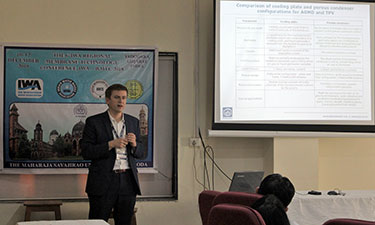 |
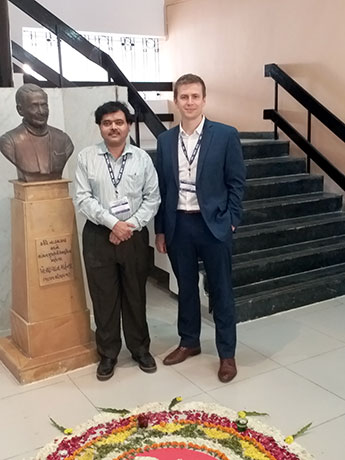 |
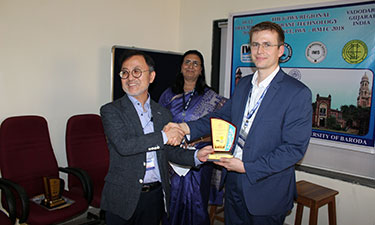 |
The coordinator of the BRICS project Alexey Volkov visited the group of Tao He (SARI CAS, China) in Shanghai on October 31, 2018. Alexey Volkov presented the latest developments in the application of porous condenser in the thermally-driven processes, and introduced the Russian group. Alexey Volkov and Tao He discussed the further actions and coordination in R&D within BRICS project.
